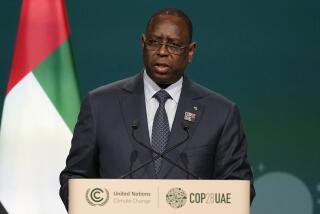Official Says Vote Date ‘Not Sacred’
- Share via
WASHINGTON — A top Iraqi official was quoted Thursday as saying that the Jan. 31 date for elections was “not sacred” and might have to be delayed, despite the insistence of U.S. authorities and of other Iraqi leaders.
President Ghazi Ajil Yawer was quoted in Baghdad by the newspaper Asharq al Awsat as saying that the vote could be postponed because of security threats. His comments came amid growing speculation in the diplomatic community that there would be a delay.
“All of us are intensively working to bring security and the rule of law to every part of Iraq, so there can be elections,” Yawer, a Sunni Muslim and tribal leader, was quoted as saying. “Yes. It’s scheduled for Jan. 31. But that date is not sacred.
“If we see that elections held by that date without security or conditions favoring a fair and comprehensive vote ... will have a negative impact on our country, then we will not hesitate to change its date.”
President Bush has repeatedly pointed to the January elections as evidence that Iraq’s recovery is on schedule. Interim Iraqi Prime Minister Iyad Allawi also has insisted that the voting will take place on the scheduled date.
But other observers contend that a delay will be necessary because election preparations are behind schedule, and under current conditions many voters may be afraid to vote.
One U.S. official said this month that he believed American authorities would be willing to accept a delay, but would not want to announce it until after the U.S. presidential elections, because of the sensitivity of the issue.
Judith Kipper, a Middle East analyst at the Council on Foreign Relations, said that though Yawer’s post was largely ceremonial, he was a “smart, cautious guy” who was influential with others in the government. She said his comments might be designed to “see how other Iraqi leaders would react, or to get the Iraqi people ready for a delay.”
Grand Ayatollah Ali Sistani, a widely respected Shiite cleric, has pushed hard to have the elections held as scheduled. But some Iraqi and American observers speculated that Sistani might be persuaded to accept a delay if it were clear that the voting could not be safely and fairly conducted on time.
According to plans made earlier this year, a large number of United Nations workers were to enter Iraq to help organize the voting. But the mission has been delayed by the lack of a security force to protect them; only a handful are currently in the country.
Separately, two prominent Iraqis voiced skepticism Thursday that 125,000 Iraqis would be prepared for security duty in their country by the end of the year, as Bush has promised.
In an appearance at the American Enterprise Institute in Washington, Rend Rahim, former Iraqi ambassador-designate to the United States, said the goal that Bush has laid out was “very ambitious.” Salem Chalabi, an Iraqi lawyer who had a prominent role in the early transitional government in Baghdad, said many of the security troops would have incomplete training.
The 125,000 troops would consist of many “poorly trained people, with maybe a few well-trained people,” said Chalabi, who is a nephew of prominent Iraqi politician Ahmad Chalabi.
The Bush administration has been promising that it will increasingly shift the security burden in the country to Iraqis.
More to Read
Sign up for Essential California
The most important California stories and recommendations in your inbox every morning.
You may occasionally receive promotional content from the Los Angeles Times.













